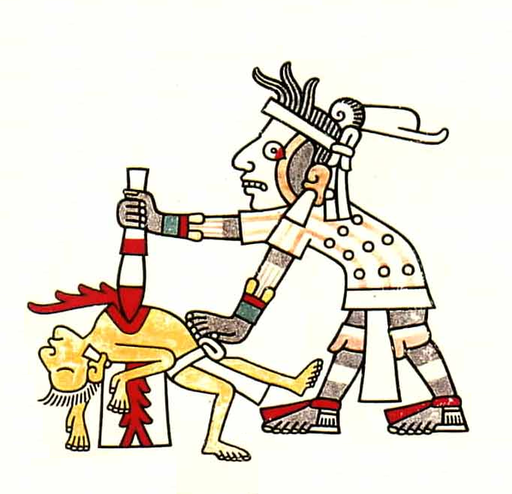
On July 25, US Attorney General William Barr ordered the Federal Bureau of Prisons to update its execution protocol and schedule five executions starting this December.
Whether you support the death penalty or not — I don’t because I prefer limited government and the power to kill disarmed prisoners in cold blood and with premeditation is by definition unlimited government — it’s worthwhile to ask: Why? More to the point, why now?
Politics, that’s why.
There’s a presidential election next year. US president Donald Trump’s re-election strategy, for lack of ability to grow his electoral “base,” is to keep that base energized and enthused so that they’ll turn out to vote instead of sitting at home catching up on re-runs of their favorite TV shows. And that base overwhelmingly supports capital punishment.
With this move Trump is quite literally throwing his supporters some red meat.
There’s nothing new about the idea. Indeed, the history of public human sacrifice for political purposes runs all the way back to ancient history in the Americas.
The last large-scale pre-Columbian example of the practice, that of the Aztecs, involved removing the beating heart of the victim atop a pyramid temple before flinging his or her corpse down the steps to the approval of a roaring crowd.
In this way, Aztec kings not only maintained support from their own populace through religious appeals, but kept smaller tribes too busy raiding each other (for sacrificial captives to be given to the Aztecs in tribute) to ally with each other against the Aztecs themselves.
If these five executions occur, they will be the first federal executions since 2003. There have only been three since 1963.
So, again, why? And why now?
Deterrence isn’t an answer that fits. Overall, violent crime (including murder) in the US has trended downward, not upward in recent decades (from 758 per 100,000 population in 1992 to 383 per 100,000 in 2017).
Neither is reducing the costs of incarceration. Of the more than 200,000 federal prisoners, only 61 are on “death row.” It’s unlikely that killing every last one of them would make a big dent in the Bureau of Prisons’ $7.3 billion annual budget.
Speaking which, if money was the problem, all five of the prisoners to be killed could as easily have been left to the justice systems of the states in which their crimes were committed and would have likely been sentenced to either death or life imprisonment without involving federal tax dollars in the first place.
The same is true regarding any moral “eye for an eye” imperative. Handling this kind of crime, and this kind of criminal, was never supposed to be the federal government’s job.
That leaves politics. Trump is playing Montezuma in hopes of holding on to his adoring crowd.
Thomas L. Knapp (Twitter: @thomaslknapp) is director and senior news analyst at the William Lloyd Garrison Center for Libertarian Advocacy Journalism (thegarrisoncenter.org). He lives and works in north central Florida.
PUBLICATION/CITATION HISTORY
- “Human sacrifice: a grand old American political tradition,” by Thomas L. Knapp, Orange County, California Register, 07/31/19
- “Human sacrifice: a grand old American political tradition,” by Thomas L. Knapp, San Gabriel Valley, California Tribune, 07/31/19
- “Human sacrifice: a grand old American political tradition,” by Thomas L. Knapp, Riverside, California Press-Enterprise, 07/31/19
- “Human sacrifice: a grand old American political tradition,” by Thomas L. Knapp, San Bernardino, California Sun, 07/31/19
- “Human sacrifice: a grand old American political tradition,” by Thomas L. Knapp, Los Angeles, California Daily News, 07/31/19
- “Human sacrifice: a grand old American political tradition,” by Thomas L. Knapp, Long Beach, California Press-Telegram, 07/31/19
- “Human sacrifice: a grand old American political tradition,” by Thomas L. Knapp, Redondo Beach, California Daily Breeze, 07/31/19
- “Human sacrifice: a grand old American political tradition,” by Thomas L. Knapp, Redlands, California Daily Facts, 07/31/19
- “Human sacrifice: a grand old American political tradition,” by Thomas L. Knapp, Inland Valley, California Daily Bulletin, 07/31/19
- “Human sacrifice: a grand old American political tradition,” by Thomas L. Knapp, Pasadena, California Star-News, 07/31/19
- “Human sacrifice: a grand old American political tradition,” by Thomas L. Knapp, Whittier, California Daily News, 07/31/19
- “Human Sacrifice: A Grand Old American Political Tradition,” by Thomas L. Knapp, OpEdNews, 07/31/19
- “Human Sacrifice: A Grand Old American Political Tradition,” by Thomas L. Knapp, River Cities’ Reader, 07/31/19
- “Human Sacrifice: A Grand Old American Political Tradition,” by Thomas L. Knapp, Claremont, New Hampshire Eagle Times [web and print], 08/01/19
- “Human Sacrifice: A Grand Old American Political Tradition,” by Thomas L. Knapp, CounterPunch, 08/02/19
- “Human sacrifice: a grand old American political tradition,” by Thomas L. Knapp, New Rockford, North Dakota Transcript, 08/05/19
- “Human sacrifice: A Grand Old American political tradition,” by Thomas L. Knapp, Wahpeton, North Dakota Daily News[web and print], 08/06/19

